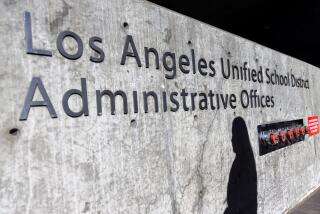No Damages for Teacher Acquitted in Molestation Case
- Share via
WASHINGTON — A California schoolteacher, subjected to “malicious prosecution” by being charged with molesting several students, and later acquitted, did not suffer a civil rights violation and is not entitled to damages, according to an appellate ruling that the U.S. Supreme Court let stand Monday.
The case grew out of charges filed against a Humboldt County teacher in 1985 in the wake of arrests in the McMartin Pre-School molestation case. It illustrates the difficulty of winning a damage suit against prosecutors or other public officials.
The high court action in the Humboldt County case does not directly affect a federal court suit filed in Los Angeles on Friday by the acquitted McMartin defendants. In that case, Peggy McMartin Buckey and others involved in the highly publicized child molestation case are asking for millions of dollars in damages, saying their civil rights were violated by county prosecutors.
However, Monday’s Supreme Court stance does show that the federal courts are reluctant to award damages against public officials who were attempting to carry out their responsibilities.
Winning in state courts in California may be even more difficult, lawyers said, because state law makes prosecutors and other public officials generally immune from damage suits.
The Humboldt County case arose when Brian Schoenfield, a fifth-grade teacher, was accused of molesting several of his female students. An untrained volunteer “child advocate” investigated the charges for school officials and prosecutors.
Though acquitted by a jury, Schoenfield said the prosecution destroyed his career and cost him $90,000 in legal fees. He sued prosecutors, school officials and the county for violating his federal civil rights and sought damages from the county. His lawyers also brought forth evidence that school investigators destroyed tape recordings of children that could have cleared him of the initial charges.
“This seemed like a perfect case” to win damages, said Wendy C. Lascher, a Ventura attorney who represented Schoenfield. “They made clear they were out to get him, and they altered evidence that could have exonerated him,” she said.
Nevertheless, a federal judge in San Francisco and the U.S. 9th Circuit of Appeals threw out the suit. The court agreed that the teacher was a victim of a malicious prosecution but, even so, ruled that he was not deprived of any constitutional or civil right. Therefore, he was not entitled to any damages, the courts said.
The Constitution says a person may not be deprived of his liberty without due process of law, the appeals court explained, but the teacher was acquitted, not imprisoned. “The only deprivation Schoenfield suffered is of the type that would naturally occur when someone is prosecuted for an infamous crime,” the court said. “Although it is perhaps surprising,” it added, “the federal Constitution does not protect an individual against malicious prosecution.”
On Monday, the Supreme Court dismissed Schoenfield’s appeal of that ruling. (Schoenfield vs. County of Humboldt, 89-616.)
In another California case, the court refused to re-enter a Los Angeles case that resulted in what was seen as a landmark victory for property rights in 1987. On a 5-4 vote, the high court in the case of First English Evangelical Lutheran Church of Glendale vs. County of Los Angeles ruled that government can be forced to pay compensation to property owners when a regulation denies them all use of their land.
But the case before the court was sent back to a Los Angeles court to consider whether the county acted reasonably in enacting an emergency flood control ordinance that prevented the church from building anything on a mountain campsite. Without holding a trial, a state appeals court said the county action was reasonable and dismissed the church’s damage suit. Lawyers for the church, in an appeal to the high court, charged that the state court had “thumbed its nose” at the 1987 decision. But without comment, their appeal was dismissed. (First English vs. Los Angeles, 89-826.)
More to Read
Sign up for Essential California
The most important California stories and recommendations in your inbox every morning.
You may occasionally receive promotional content from the Los Angeles Times.














